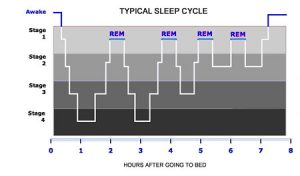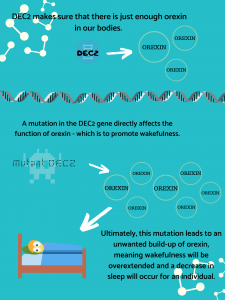How much sleep do you get on a nightly basis? With all of the commitments that a student must subject to, one can expect that number to be quite low. Much of Western society has been raised on the knowledge that 7+ hours of sleep is the most ideal for an adult. But what happens to us if we don’t reach this threshold of “enough” sleep? How do some people seem to get by comfortably on much less? And how are individuals able to wake up easily in the morning while others have to hit snooze quite frequently? The answer to the latter 2 questions can be attributed to none other than our own genes.

An image of a baby sleeping.
Retrieved from https://pixabay.com/photos/baby-sleeping-sleep-childish-cute-1941745/
It is common knowledge that reduced amounts of sleep leads to a variety of negative effects. Growth hormones are released during this time, which is why many adults blame lack of growth to not getting enough sleep. You may have also heard about how sleep affects your rate of metabolism, and that sleeping increases weight loss. This is due to the fact that while asleep, your body secretes appetite-reducing chemicals, which are meant to decrease the chances of hunger interfering with your rest. Studies have shown that our body’s DNA repair mechanisms are heightened when we’re asleep, because this is the time in which we undergo the least amount of chemical and mechanical stress from outside forces.

A graph of the sleep cycle, showing the stages of sleep corresponding to time. Retrieved from https://www.flickr.com/photos/37583694@N04/3457948158
For a subset of the population, a shorter average sleep cycle is actually enough to carry on their daily lives feeling energized. Each gene in our DNA is converted into one protein through intricate biological processes. A study by Ying-Hui Fu’s lab focused on the DEC2 gene, which codes for a certain protein that is an important regulator for the protein orexin. The diagram below explains the the DEC2 mechanism in detail. The study also uncovered that short sleepers (those with the DEC2 gene mutation) had 6.25 hours of sleep while others (those without the DEC2 gene mutation) had 8.06. This shows the natural difference in the amount of sleep that short sleepers felt was necessary to feel refreshed.

DEC2 mechanism in a graphic representation. Image source: Francine Flores, made with Canva
Another mystery in the sleep world pertains to “night owls” vs. “early birds”. A study by Samuel Jones’ lab has found that variation at 351 locations in the genome affects the waking patterns within different people, termed as one’s chronotype. The fluctuation in expression of these genes has shown a 25 minute difference in the waking times of the most extreme early risers and the most extreme late risers.

An image of DNA. Retrieved from https://www.publicdomainpictures.net/en/view-image.php?image=31530&picture=structure-of-dna
There are many questions up in the air concerning sleep and sleep patterns. With our knowledge of the reasons behind occurrences such as short sleepers and waking tendencies, we can further our understanding of why we need sleep and how much sleep is enough to sustain our day-to-day systems. Using the information from current and future studies, we can address issues that individuals have regarding sleep and take a step toward solving more of our sleep mysteries.
Written by Francine Flores

One response to “Sleep Mysteries: The Ideal Sleep Threshold, Short Sleepers, and Early Risers”